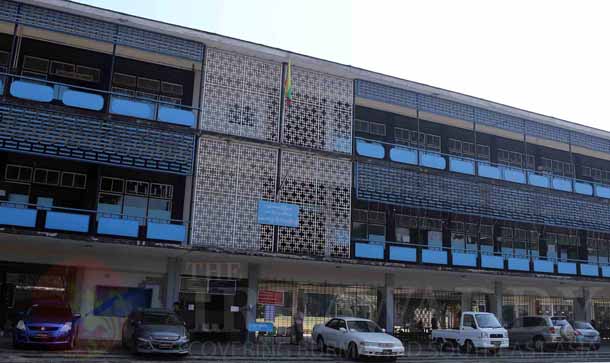RANGOON — A select group of students from Burmese medical schools are starting a new program aimed at moving them beyond the classroom and into outpatient clinics earlier in their studies, as part of a larger push to improve the professionalism of doctors.
Twenty students in their second year at the University of Medicine 1 and the University of Medicine 2 in Rangoon are making their first clinic visits on Saturday to observe doctors at work with patients. The doctors, private physicians from the Myanmar Medical Association (MMA), will serve as mentors to two students each, to discuss critical issues including autonomy, respect for patients and how to handle conflicts of interest.
The mentorship program, only in its pilot stage this year, is a departure from the current system at the country’s four medical universities, which are all government run. Usually students begin clinical work one year later, with less individual attention, and they spend their time in inpatient settings.
The hope is that students can get a better understanding of positive doctor-patient relationships in an outpatient setting, where patients are less sick and more capable of discussing their options.
“We want students to learn professional and ethical relationships between doctors and patients,” says Dr. Win Zaw, a member of the MMA who helped select the students from a pool of about 150 applicants.
Aung Soe, a professor at the University of Medicine 2, says that with the current system at his university, about five students are assigned to one attending doctor when they start clinical work in their third year of studies. A bigger problem, he says, is the student-teacher ratio in the classroom.
“Actually, one teacher should have 10 to 20 students, but for our department one teacher has 125 students,” he says. “I think it’s not effective for teaching. They cannot learn well.”
He adds that it would be better if students could begin clinical work in their first year at school, as is the practice in some other countries.
“At most medical schools in the United States, we start our clinical exposure as soon as we start medical school,” says Myaing Myaing Nyunt, a Burmese doctor and public health researcher who helped design the mentorship program along with the Ministry of Health, the universities and the MMA. She went to medical school in Rangoon during the 1980s before moving to the United States, where she now works at the University of Maryland’s School of Medicine.
“In the West, and also in some Eastern countries, we have shown that this early introduction of young medical students to these doctors in the real setting, community setting, improves their understanding not only of the doctor-patient relationship, but also they have a more meaningful experience learning anatomy, physiology, biochemistry—these dry, extremely boring subjects.”
The doctor-patient relationship is crucial not only to improve the quality of medical care, she says, but also to protect doctors.
“We are starting to see lawsuits here—the patients are questioning—which I have never seen in my life in Myanmar,” she says.
As part of the transition from military rule, Burma has in the past three years begun to allocate more funds to education and health care, although defense spending still constitutes a much larger share of the national budget. The government is working with international donors toward an ambitious goal of achieving universal health care by 2030, in a country where a majority of people currently lack access to hospitals and doctors. In the education realm, reformers are calling for greater autonomy for universities, which were tightly controlled by the former regime.
The mentorship program is perhaps another sign of the growing desire for academic freedom.
“In the graduate level or undergraduate level, schools are still government-sponsored programs. What we’re doing is really taking the students with fresh minds out of these traditional programs and putting them in the hands of outsiders, of community physicians,” Myaing Myaing Nyunt says.
With funding from the Open Society Foundations, a grant-making operation founded by George Soros, she is also working to promote bioethics training for medical school teachers, as well as the development of the country’s two Ethical Review Committees (ERC), which review the ethical soundness of research protocols. Burma has ERCs under the government’s Department of Medical Research and the military’s medical research center, but they are not currently up to international standards.
“In the composition of the committee, a woman has to be included, community members have to be included, and somebody who is non-science or non-medical has to be included, to ensure there are different perspectives for the patient’s sake,” she says.
She is helping the ERCs register for Federalwide Assurance (FWA), or an agreement with the US Department of Health and Human Services about ethical oversight. This US-led global standard for ethics committees is intended to ensure the protection of human subjects, and compliance is helpful for obtaining research grants.
As Burma continues to seek international development assistance, she says institutional development is a crucial area that should not be forgotten.
“Myanmar is the darling of the whole world right now, but that’s not going to last long, and at some point people will go on with other popular countries,” she says.
“Foreign aid is good, but I think there should be a very constructive way to promote institutional development, investing in more long-lasting kinds of activities. This is why I don’t just like doing workshops—it’s a lot of money and a lot of time, and then people leave and nothing is left behind.”

















